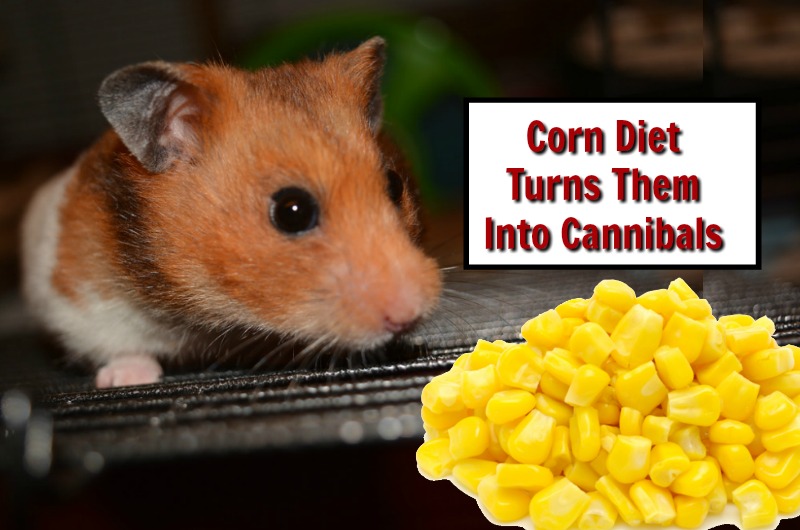Corn Diet Turns Endangered Hamsters Into Cannibals
By Heather Callaghan, Editor
Did you know that the European hamster is endangered in western Europe? Cannibalism doesn’t help.
The wild European hamster (Cricetus cricetus) has been dying off at an unprecedented rate and a new paper demonstrates why.
Researchers first had to realize the that the previous, native diet of these cute rodentia consisted of of grains, roots and insects. But it is in the areas industrial farming and monoculture where a drop in populations are. Researchers do not think ploughing or pesticides are to blame here, but that it is a strict diet of corn that is killing the species in a bizarre way.
Researchers led by Mathilde compared wheat and corn diets in wild hamsters in the lab. No notable differences happened until it was time for the pups to wean.
Widget not in any sidebars
The Guardian notes:
Only 5%, however, of the baby hamsters whose mothers ate corn instead of wheat made it that far. What was most disturbing is how they perished.
via Gizmodo [emphasis added by H.C.]:
The horrific results found that mothers were kept their pups with their stash of maize and eventually ate them alive. They also developed “black-tongues” and began acting erratically, “climbing and pounding their feeders.”
“Improperly cooked maize-based diets have been associated with higher rates of homicide, suicide and cannibalism in humans,” the researchers pointed out. A deficiency of the vitamin B3 has been traced to a condition called pellagra. It’s believed that three million people died from pellagra between 1735 and 1940.
High-corn diets are often blamed for vitamin B3 deficiencies today, and the sheer amount of corn ingredients is staggering, not to mention, most of it is genetically engineered.
When the hamsters’ mothers were given vitamin B3 along with their corn diets they actually returned to normal activities and stopped eating their offspring. Anyone who has worked with animals has probably seen the cannibalism issue that often boils down to a deficiency.
So we know what is happening but, unfortunately, the hamsters are considered pests by farmers and it is their activity that is “feeding” them out of existence. Not to mention, how on earth would you make sure the hamsters have vitamin B3? And then what would you do with them since they would pose a bigger threat to farms? This is yet another big issue that happens when clearing giant plots of land for one crop year after year – and then adding untested GMOs and extra-strength pesticides to the pot. GE crops have only been around for 20 years or so – and, yet, there could already be crucial ecological consequences.
While the European hamster is considered a pest by farmers maintaining bio-diversity is important to the ecosystem and in France it’s important to the law. The European Union’s highest court, ruled in 2011 that the country must adjust policies to protect the hamster or face fines up to $24.6 million. According to the researchers, it’s clear that the best policy to fix this situation is a concerted effort “to restore a diverse range of plants in agriculture schemes.”
We’re not really sure what those policies are or how industrial farming could suddenly switch to being more diverse.
But I think the bigger, unanswered question here, is – how is monoculture affecting humans? B vitamin deficiencies have been looked at in mothers who have thoughts of killing their babies already – so why haven’t we looked at monoculture and food additives as an issue? (Vitamin B3 has been used to alleviate schizophrenia and alcoholism, too.) Also, what are the implications of eating GE corn that has transgenic material known to mesh with genetic makeup of the very weeds it was designed to help eradicate?
Here we have an accidental study found in nature – albeit, an industrialized nature. Shouldn’t we look deeper?
Maybe these endangered hamsters are the new canaries in the coal mine.
Photo credit: rawdonfox via Visual Hunt / CC BY – modified
Heather Callaghan is an independent researcher, writer, speaker and food freedom activist. She is the Editor and co-founder of NaturalBlaze as well as certified Self-Referencing Practitioner.
Get a nifty FREE eBook – Like at Facebook, Twitter and Instagram.





